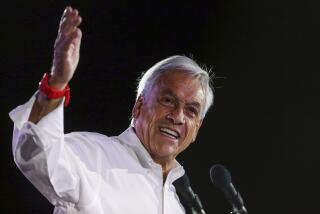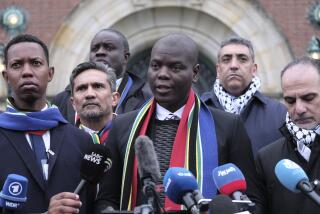For Human Rights, a Win Either Way
Any day now, a committee of British Law Lords will announce the fate of former Chilean dictator Augusto Pinochet. The 83-year-old former general will either be bound over for extradition to a Spanish court seeking him on charges of multiple murder and torture, or he will be released and sent back to Chile.
It’s anyone’s guess how the Law Lords will rule on Pinochet’s claim that as a former head of state he enjoys immunity. But the final British verdict matters little. Either way constitutes a win for both the international human rights community and for Pinochet’s victims and their families.
Much of the justice that so many of us sought since Pinochet bloodily shot his way into power in 1973 has been achieved in the four months since Scotland Yard served the Spanish warrant on the aging tyrant. Pinochet’s humiliating arrest, the demand by more than a half-dozen European nations that he be prosecuted, even his own weak legal defense have forever corrected his historical legacy. He was nabbed just a few months after he assumed the pompous title of senator-for-life and just as he was spinning a campaign to launder his public image.
But his arrest and detention have served to vividly remind the world that--in spite of Baroness Margaret Thatcher’s testimonials to his character--Pinochet and his regime immolated Chilean democracy, took the lives of more than 3,000 political opponents, made 1,100 people “disappear” into unmarked graves, imposed systematic torture on tens of thousands of detainees and sent even more into exile.
His lawyers have feebly argued not the facts of the case, but only that Pinochet is immune. But “immunity does not equal impunity,” says Chilean legislator Juan Pablo Letelier, whose father was killed by a car bomb planted in Washington, D.C., by Pinochet’s secret police in 1976. No longer can Pinochet’s crimes be denied or concealed.
The four months of Pinochet’s captivity have radically and irrevocably redrawn the Chilean political map. The two civilian administrations that have governed Chile since 1990 cut a Faustian bargain with Pinochet: He would not disturb their rule if they respected the self-granted amnesty the general lavished on himself and his collaborators. The civilian political establishment and a docile Chilean media colluded in politically anesthetizing the population and imposing a collective amnesia about the horrors of the recent past.
But that “consensus” of silence has been forever shattered. Pinochet’s arrest has restored Chile’s historical memory. The determined band of Chilean human rights activists who kept the flame of justice flickering through a dark quarter century have moved from the margin of national debate to its red-hot center. According to recent polls, two-thirds or more of Chileans want the dictator tried somehow, somewhere.
If the British verdict goes against Pinochet, the ensuing legal process could pry open still secret files on Pinochet’s state terror network, including those still in the possession of U. S. intelligence agencies. But, frankly, it is unlikely there would ever be a formal trial. Pinochet’s advanced age, a barrage of anticipated appeals and the mazelike Spanish judicial bureaucracy make it dubious that he would face his final judgment in a courtroom.
But what if Pinochet is set free? Yes, he and his extremist defenders would crow victory. But Pinochet’s boasts would ring hollow. “He can no longer fool or frighten us,” editorialized the Chilean opposition magazine Punto Final. “Pinochet is but a sad, old thug.”
Indeed, Pinochet’s return home would dramatically call the bluff of Chilean President Eduardo Frei, who disingenuously said in criticizing the British arrest that “Chileans should be judged only in Chilean courts.” Of course, the government would strain to protect Pinochet.
But the pressure to do otherwise would be formidable. Spain, and as many as eight other European countries would demand that Chile extradite him for trial. A quirky and courageous Chilean judge, Juan Guzman Tapia, has accepted and opened 15 separate murder cases against Pinochet and vows he will proceed.
Pinochet’s return could only act as a catalyst to accelerate the clamor for justice that his arrest unleashed. The torture and murder that bloodied Chilean soil for 17 years was not the work of just one ruthless dictator. It was a sophisticated machine whose operators, engineers and minions still lurk in the shadows of impunity. Dumping Pinochet back in Chile might be the most effective way to finally submit the remnants of his whole horrible system to the scrutiny and light of justice.
More to Read
Sign up for Essential California
The most important California stories and recommendations in your inbox every morning.
You may occasionally receive promotional content from the Los Angeles Times.










